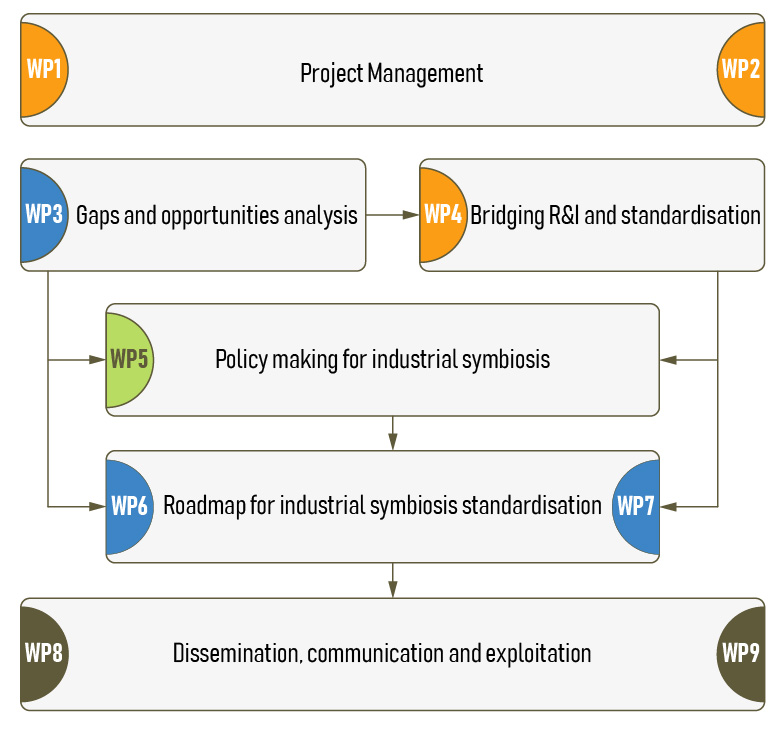About RISERS
RISERS (A Roadmap for Industrial Symbiosis Standardisation for Efficient Resource Sharing) is committed to guiding the standardisation of industrial symbiosis to enhance resource efficiency across Europe. This initiative, launched under the European Union’s Horizon Europe Programme, offers a solution to fill in standardisation gaps and address the significant barriers hindering the establishment of standards for efficient resource sharing. By collaborating with experts and practitioners from various sectors including industry, policy, academia, and standardisation bodies, conducting thorough mapping of the IS standardisation landscape and identification of opportunities for intra- and inter-sectoral synergies, RISERS will provide a comprehensive Roadmap that will steer IS standardisation efforts in Europe toward greater efficiency and sustainability.
Our mission is to establish clear pathways and actions aimed at developing essential standards conducive to high-impact synergies for Europe’s economy. We are committed to facilitating a cohesive strategy for integrating Research and Innovation (R&I) into standardisation processes. Through collaborative efforts with stakeholders, we seek to develop a robust standardisation framework that enhances industrial symbiosis, fostering interoperability and compatibility. This streamlined approach optimises resource utilisation, benefiting industry, the environment, and society at large.
The RISERS project was launched in January 2024 with a duration of 3 years.
How our project is organised

WP1 & WP2 – Project Management
WP1 (months 1-18) and WP2 (months 19-36) are dedicated to project management
Lead: ENSPIRE
Objectives:
- To provide overall project management, including procedures, risk, data and IPR management.
WP3 – Gaps and opportunities analysis
Duration: WP3 (months 1-18)
Lead: UGent
The work package involves a vertical and horizontal analysis of gaps and opportunities for industrial symbiosis, including an assessment of existing standards and an impact assessment, to identify priority synergies between sectors and industries.
Objectives
- Identify the IS potential of EU-priority resources and their potential impact, allowing the creation of a list of 6-10 priority synergies to facilitate through standardisation;
- Assess the standardisation status relevant to priority synergies and the standardisation alignment between partner sectors A (generator) and B (user), to identify gaps and opportunities for IS standardisation.
WP4 – Bridging R&I and standardisation
Duration: WP4 (months 19-36)
Lead: ISQ
The work package focuses on strengthening the links between R&I and standardisation, promoting the valorisation of R&I results for IS standardisation.
Objectives
- Identify current R&I activities related to the priorities for IS standardisation;
- Identify IS standardisation needs based on current and future IS-related R&D projects;
- Engage the R&I community in demand-led innovation to advance priority synergies that meet defined industry needs;
- Produce recommendations for R&I-related directions for standardisation that will be fed into the roadmap for industrial standardisation (WP7).
WP5 – Policy making for industrial symbiosis
Duration: WP5 (months 1-36)
Lead: Fraunhofer ISI
The work package focuses on the engagement of policymakers and the development of policy frameworks that can support industrial symbiosis.
Objectives:
- Contribute to the engagement of the policy community in creating the context to motivate uptake of industrial symbiosis;
- Improve the market conditions for innovative IS solutions by an improvement of the policy framework;
- Analyse opportunities and relevant sectors to support IS by regulation, also including public procurement policies.
WP6 & WP7 – Roadmap for IS standardisation
Duration: WP6 (months 1-18) and WP7 (months 19-36)
Lead: CEN-CENELEC
The work package is dedicated to the development of the Industrial Symbiosis Standardisation Roadmap and guidelines for Technical Committees to address industrial symbiosis in standardisation deliverables.
Objectives:
- Collect input from standardisation technical bodies relevant to IS;
- Engage with standardisation experts in the project;
- Integrate results from previous work packages covering different angles (Industry, Research, Policy) into recommendations for future action to be addressed in standardisation (standardisation roadmap);
- Facilitate the uptake of industrial symbiosis into the standardisation process and deliverables;
- Provide guidance for standardisation experts to address circularity of resources/ IS in standardisation deliverables.
WP8 & WP9 – Dissemination, communication and exploitation
Duration: WP8 (months 1-18) and WP9 (months 19-36)
Lead: IETU
The work package involves the dissemination, communication and exploitation strategy and activities, as well as networking and collaboration with other initiatives and engagement of stakeholders through workshops.
Objectives:
- Create awareness and give visibility to the project and its results through a robust, ad-hoc dissemination and communication strategy;
- Monitor the achievement of the communication and dissemination objectives and relevant KPIs;
- Build a network of stakeholders for interaction and cluster with other relevant initiatives;
- Ensure relevance and applicability of the project results through interaction with stakeholders and end-users;
- Foster the take-up of project results.



